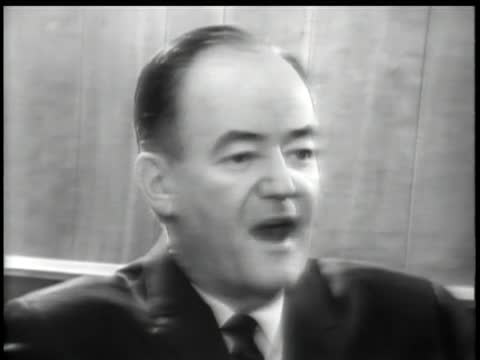Radical Americans; 6; Past, Present and Future
- Series
- Radical Americans
- Episode Number
- 6
- Episode
- Past, Present and Future
- Producing Organization
- WGBH Educational Foundation
- Contributing Organization
- Library of Congress (Washington, District of Columbia)
- AAPB ID
- cpb-aacip-512-vm42r3q34b
- NOLA Code
- RADA
If you have more information about this item than what is given here, or if you have concerns about this record, we want to know! Contact us, indicating the AAPB ID (cpb-aacip-512-vm42r3q34b).
- Description
- Episode Description
- This episode deals with the roots of radicalism in this country in the 19th century and briefly traces its growth and influence. There are radicals on this episode: politicians who have fought the more extreme forms of radicalism, and historians all trying to put radicalism in some perspective. Appearing on the episode is Vice President Hubert Humphrey, who talks about the tradition of radicalism in the Minnesota area of the country, an area that spawned Populism and other movements. He speaks of the infiltration by Communists of the Farmer-Labor Party in Minnesota when he was mayor of Minneapolis and how, by hard work and rounding up the votes the Communists were gotten out. Also on the episode are Norman Thomas, a radical of a former time, presidential candidate on the Socialist party ticket, now the benign dean of radicalism in this country; Michael Harrington, author of The Other America, which spelled out the social problems of poverty in this country, a book that has been taken up as the bible of the young radicals of today; IF Stone, editor of the radical newsletter IF Stone's Weekly; Richard Rovers, political writer whose columns in The New Yorker are among the most incisive on the Washington scene; and Professor Daniel Bell, of Columbia University, a sociologist who is widely respected for his insights into radical movements in this country. (Description adapted from documents in the NET Microfiche)
- Series Description
- The growing wave of radical movements in the United States today both on the left and the right are examined in first-hand, on-location reports, interviews, coverage, and commentary throughout a cross-section of the country. The Radical Americans explores the underlying concern of both poles the threat to individual freedom. What the left and right wing radicals have to offer as solutions, the means they use to proselytize their views, the real motivations and historical impact of their power are probed in the series. Camera crews traveled throughout the US documenting campuses, ghettos, towns, cities, in meetings, the views and actions of well-known and obscure citizens and groups involved directly and indirectly with radical movements. The gamut of spokesmen includes politicians, historians, Communists, Black Muslims, members of the John Birch Society, ultra conservative and liberal professors, writers, and civil rights leaders. In documenting coverage, the production crews of The Radical Americans at times were met with resentment, fear, and opposition by people in places chosen for the series report. The Radical Americans is a 1966 production of National Educational Television and WGBH, Bostons educational television station. The 6 episodes that comprise this series each run about 30 minutes. (Description adapted from documents in the NET Microfiche)
- Broadcast Date
- 1966-05-08
- Asset type
- Episode
- Rights
- Published Work: This work was offered for sale and/or rent in 1972.
- Media type
- Moving Image
- Duration
- 00:29:41
- Credits
-
-
Associate Producer: Bywaters, Thomas
Interviewee: Harrington, Michael
Interviewee: Humphrey, Hubert H.
Interviewee: Stone, I. F.
Interviewee: Rovers, Richard
Interviewee: Thomas, Norman
Interviewee: Bell, Daniel
Producer: Fouser, Don
Producing Organization: WGBH Educational Foundation
Reporter: Fouser, Donald
Writer: Fouser, Don
- AAPB Contributor Holdings
-
Library of Congress
Identifier: cpb-aacip-436220d836f (Filename)
Format: 1 inch videotape: SMPTE Type C
Generation: Master
Color: B&W
-
Library of Congress
Identifier: cpb-aacip-523c58038bc (Filename)
Format: 2 inch videotape
Generation: Master
Color: B&W
-
Indiana University Libraries Moving Image Archive
Identifier: cpb-aacip-a0f53d91f9c (Filename)
Format: 16mm film
-
Library of Congress
Identifier: cpb-aacip-6ee423e487f (Filename)
Format: U-matic
Generation: Copy: Access
Color: B&W
-
Identifier: cpb-aacip-86a5dd3eb99 (unknown)
Format: video/mp4
Generation: Proxy
Duration: 00:29:41
If you have a copy of this asset and would like us to add it to our catalog, please contact us.
- Citations
- Chicago: “Radical Americans; 6; Past, Present and Future,” 1966-05-08, Library of Congress, American Archive of Public Broadcasting (GBH and the Library of Congress), Boston, MA and Washington, DC, accessed January 30, 2026, http://americanarchive.org/catalog/cpb-aacip-512-vm42r3q34b.
- MLA: “Radical Americans; 6; Past, Present and Future.” 1966-05-08. Library of Congress, American Archive of Public Broadcasting (GBH and the Library of Congress), Boston, MA and Washington, DC. Web. January 30, 2026. <http://americanarchive.org/catalog/cpb-aacip-512-vm42r3q34b>.
- APA: Radical Americans; 6; Past, Present and Future. Boston, MA: Library of Congress, American Archive of Public Broadcasting (GBH and the Library of Congress), Boston, MA and Washington, DC. Retrieved from http://americanarchive.org/catalog/cpb-aacip-512-vm42r3q34b
